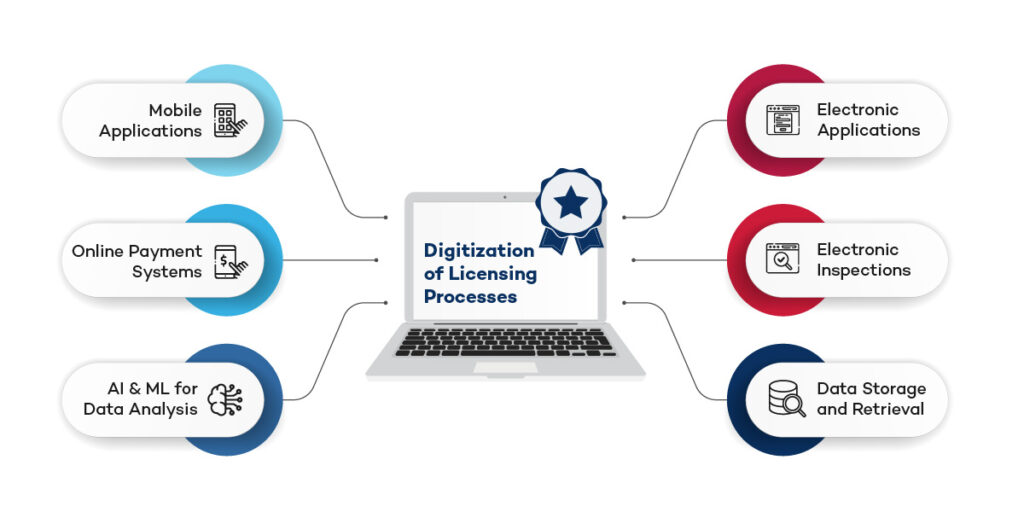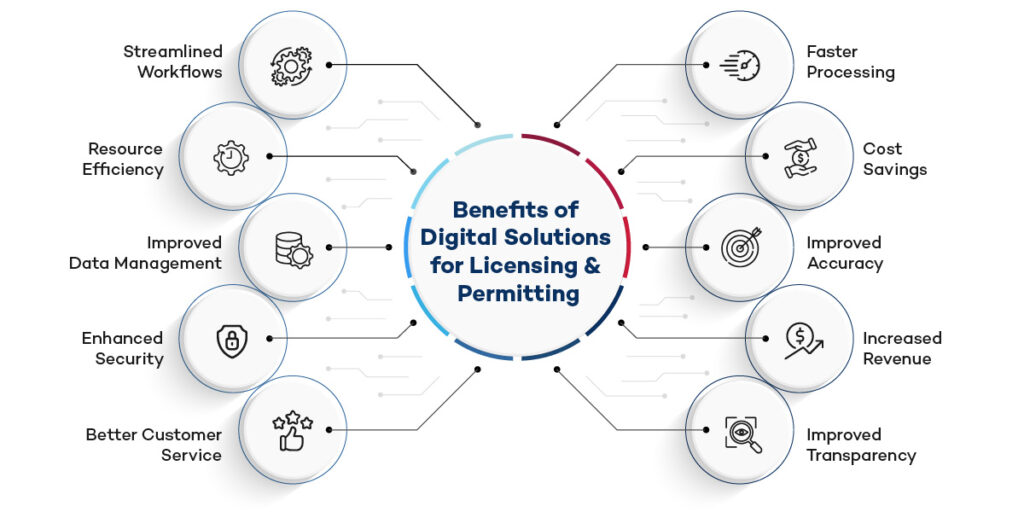Licensing and permitting agencies in the US are government bodies responsible for regulating and overseeing various business and occupational licenses and permits. These agencies play a critical role in ensuring public safety, protecting consumer interests, and maintaining a level playing field for businesses. These licensing processes require significant resources in terms of time, money, and personnel to complete. A digital solution for permitting and licensing can help streamline these processes, reducing costs and improving efficiency. According to a Deloitte survey covering more than 1200 government government officials from over 70 countries on digital transformation, three-fourths of the respondents said that digital technologies are disrupting the public sector and nearly all (96 percent) remarked the impact on their domain as significant.
In this blog, we discuss the major benefits of modernizing or digitizing licensing and permitting processes in regulatory agencies and how it helps agencies manage some of their key processes more efficiently.
Government licensing and permits are crucial for businesses to operate legally. These are typically required for industries such as construction, healthcare, and transportation, among others. Permitting and licensing procedures aim to ensure compliance with various laws and regulations. For instance, a construction permit ensures that a building is compliant with building codes and regulations. Similarly, a healthcare license ensures that medical professionals adhere to industry standards, protect patient privacy, and ensure quality care.
The scope of licensing and permitting agencies varies depending on the jurisdiction and the industry. Some common types of licenses and permits that these agencies may oversee include:
- Professional licenses: These are required for individuals working in regulated professions, such as doctors, lawyers, and engineers.
- Business licenses: These are required for businesses to operate in certain industries, such as food service, construction, and healthcare.
- Environmental permits: These are required for businesses that may impact the environment, such as those that produce hazardous waste or emit pollutants.
- Building permits: These are required for construction projects to ensure compliance with building codes and safety regulations.
- Special event permits: These are required for events that may impact public safety, such as parades, festivals, and concerts.
However, the traditional process of licensing and permitting is often time-consuming and cumbersome. Businesses need to obtain and complete forms or paperwork manually, which then has to undergo a review process. Any inaccuracies or errors in the application may result in a rejection or delay of the application process. The significant amount of paperwork can also lead to high costs and wastage of resources. Modernizing licensing and permitting processes using using a digital solution for licensing and permitting can help streamline these processes.
Modernizing Licensing & Permitting Processes – What It Means?
With digitization, businesses can obtain, complete and submit their applications online, and the process becomes faster and more efficient. At the agency end, all employees within the agency can access the applications, assign work items, review, approve, conduct inspections, process complaints, etc., all from a single application. This can also reduce the costs associated with printing and distributing forms.

Some of the major licensing processes that can be digitized are:
- Electronic Applications: The use of electronic applications can simplify the licensing and code enforcement process. Applications can be filled online and submitted to the relevant authorities.
- Electronic Inspections: Inspections can be carried out using modern technology such as drones and cameras. This can help inspectors to identify violations quickly and efficiently, thereby reducing the time and effort required for inspections.
- Data Storage and Retrieval: Cloud-based systems can be used to store and access data related to licensing and code enforcement. This can make it easier for authorities to manage data and make it more accessible to the public.
- Mobile Applications: Mobile applications can be used to report violations and receive feedback from the public. This can help authorities to respond to violations quickly and improve community involvement.
- Online Payment Systems: Online payment systems can be used to process fees, penalties, etc. related to licensing and code enforcement. This can make the payment process more convenient for businesses and individuals.
- Analysis and Decision Making using Artificial Intelligence and Machine Learning: AI and machine learning can be used to analyze data and identify patterns in violation trends. This can help authorities to proactively identify potential violations and reduce the likelihood of future violations.
Benefits of Using Digital Solutions for Licensing & Permitting Modernization
There are several benefits of implementing a digital solution for licensing and permitting:

Faster processing times
Businesses can submit applications online, and the agency staff can process and review them much faster than a manual process. Staff can concentrate on reviewing applications rather than managing the paperwork needed for each application.
Improved Accuracy
A digital system can automatically correct or flag errors in an application, which minimizes delays due to rejected applications.
Cost Savings
Businesses will save money as they no longer have to spend on materials such as paper, ink, and postage.
Improved Transparency
A digital system can provide real-time updates on the status of an application. This saves applicants from making inquiries and reduces the number of phone calls or emails received by the government.
Streamlined Workflows
Permitting and licensing processes run seamlessly as information is routed electronically between departments. This removes bottlenecks caused by manual processes where paperwork may be lost or delayed.
Increased Revenue
A streamlined system allows government agencies to process applications more efficiently, increasing the number of licenses and permits issued, which generates revenue.
Resource Efficiency
The solution reduces the burden on staff members, and offices can operate with reduced personnel to manage licenses and permits, resulting in significant savings on personnel expenses.
Improved Data Management
A digital system provides better control over essential data such as the status of permits and licenses, remitted fees, and online payments made. If government employees need specific data, they can access it quickly without having to hunt through paper records.
Better Customer Service
Online applications for licenses and permits can offer a chatbot to guide applicants through the process. This could result in better communication between applicants and government agencies, and thus, better overall experiences for customers.
Enhanced Security
Digital systems can be designed following security protocols and provide better data protection, reducing data breaches.
Conclusion
Licensing and permitting modernization is a step that every government agency should consider improving efficiency and constituent experience. It allows the government to process applications more quickly, increase revenue, and it is cost-effective as it reduces overhead costs. It also alleviates the workload on employees, allowing them to focus on more critical tasks. The constituents on the other hand benefits from seamless self-service processes saving them from the need to visit the agency for things to get done, make a phone call or follow up in emails.
In conclusion, the shift toward digitization is vital for government agencies to improve their operations in this modern technological era. Digitizing the permitting and licensing process can boost productivity and provide efficiencies and cost savings. It fosters transparency and accountability, not to mention the convenience it offers to businesses by speeding up the approval process. The implementation of a digital solution for licensing and permitting modernization is long overdue to simplify the bureaucracy in our daily lives. It’s time agencies take this important step.
Interested in knowing more about modernizing licensing and permitting processes in regulatory agencies? Contact us.





